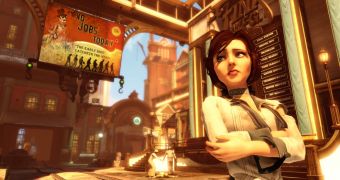BioShock Infinite is a wonderful game, one that doesn’t take too much time to play through and offers a story-based experience that will probably remain unparalleled this year, filled with emotion, existential concepts and some great acting.
Ostensibly, the main character of BioShock Infinite is Booker DeWitt but, despite the solid voice work and glimpses of his face, both Elizabeth and Columbia overshadow him.
I was genuinely happy to play through the game in one weekend but now, two days later, I am starting to wonder whether the excellent narrative and the almost perfect A.I. companion Elizabeth have led me to pay less attention to the floating city of Columbia.
The city is majestic, an intuition-powered wonder of technology that’s separate from the world, reflecting the sanitized views of its inhabitants while hinting at the dark realities that Infinite will then explore.
But Columbia compares unfavorably to Rapture, the game of the first two BioShock titles, and feels less organic and less interesting, even if the bigger open spaces for battle are always welcomed.
The developers seem to have spent fewer resources creating an organic world because they had a better target for their efforts: Elizabeth.
It’s impossible to play Infinite without developing an emotional bond to the girl and to the mix of vulnerability and alienation that she embodies.
But as I appreciated her animations, her helpfulness in combat and her well written dialog, I could not help but wonder whether her central role and the resources were the reason that Columbia faded into little more than a background for the complex and doomed relationship between Elizabeth and Booker.
I loved almost every minute spent in the world that BioShock Infinite created for me, but I regret that I found out so little about this flying city by the time the experience was done.

 14 DAY TRIAL //
14 DAY TRIAL //